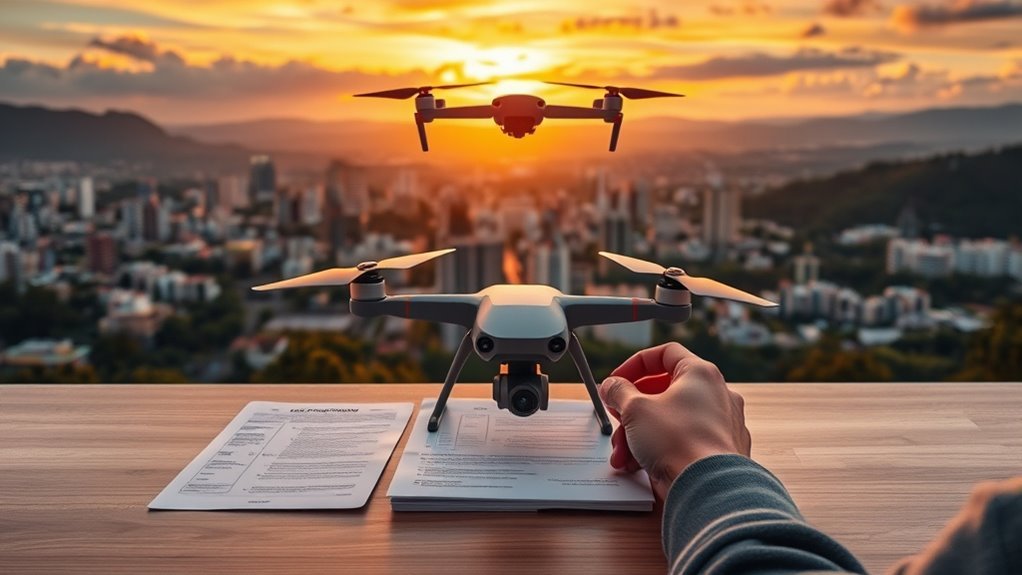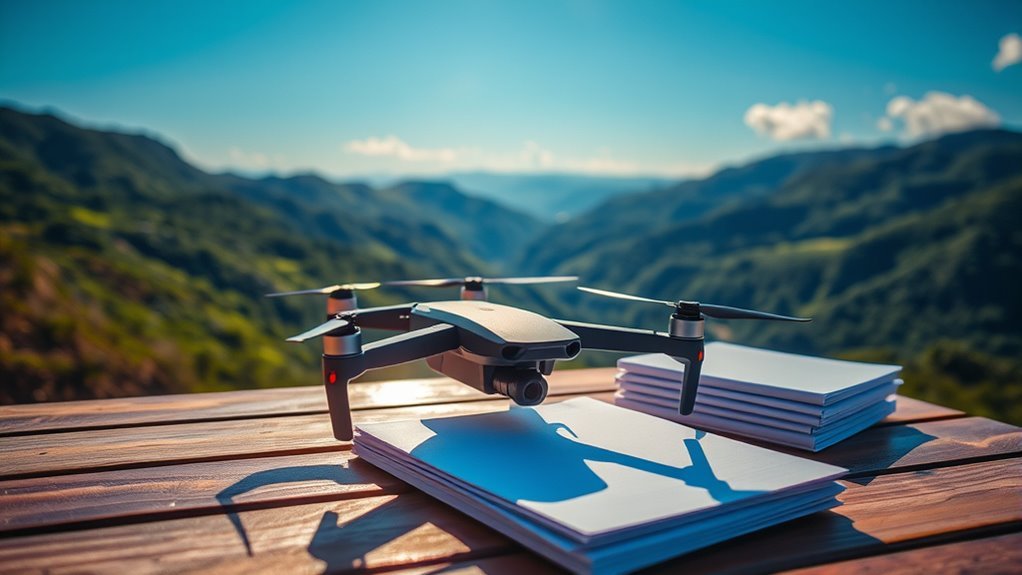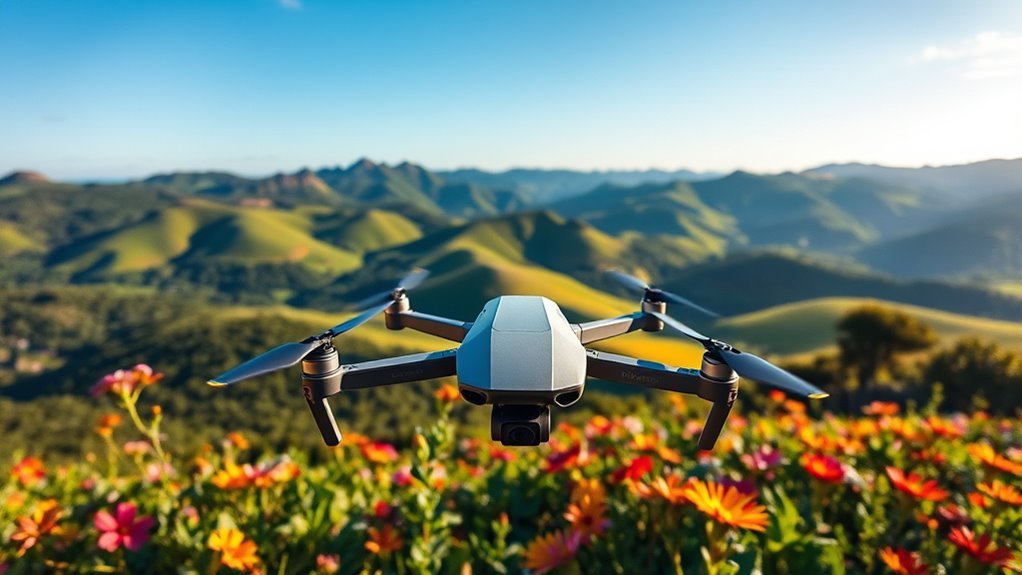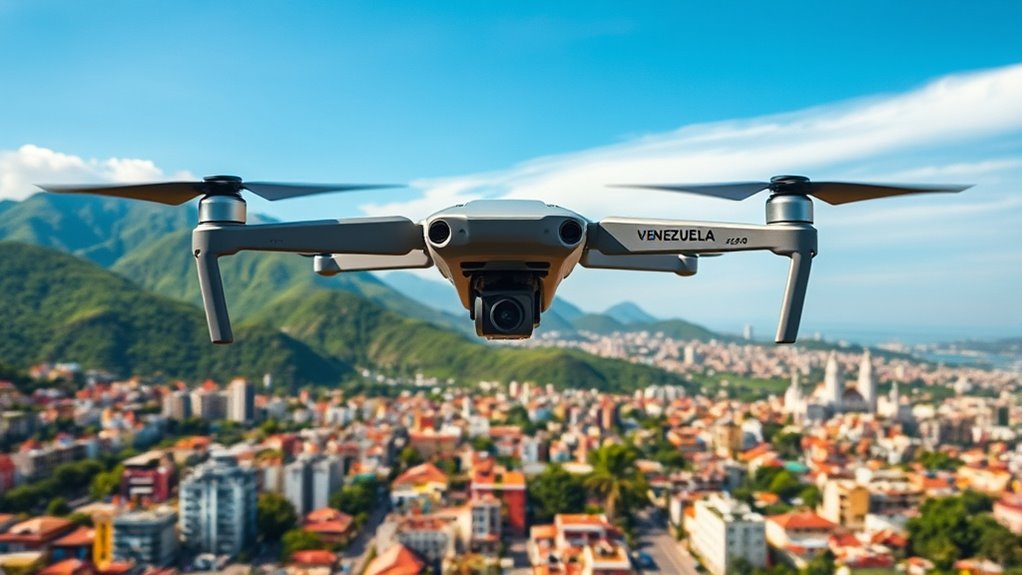To legally operate a drone in Venezuela, you must register your drone with authorities, providing details about its specifications and intended use. If you plan to use it commercially, you’ll need specific permits and must demonstrate pilot qualifications and adherence to safety standards. Be aware of strict restrictions on flying in urban areas and near airports. Violating these laws can lead to fines or confiscation of your drone. Knowing the details can help you navigate these regulations effectively.
Overview of Drone Regulations in Venezuela

Although drone technology offers numerous benefits, understanding the legal landscape in Venezuela is essential for operators. The regulations governing drones here are complex, reflecting the government’s attempts to control airspace and safeguard national security. For those interested in aerial photography, it’s vital to be aware of the restrictions on flying in urban areas or near sensitive sites. Unauthorized flights can lead to severe penalties, including confiscation of equipment. Additionally, operators must remain updated on evolving laws, as regulations can shift rapidly. Engaging in responsible drone use not only protects your rights but also promotes a culture of freedom and innovation in the country. Ultimately, being informed is key to steering through this challenging environment effectively.
Drone Registration Requirements

Understanding the drone registration requirements in Venezuela is essential for any operator looking to comply with the law. First, you need to identify the drone types you’re operating, as regulations can vary based on weight and usage. The registration process involves submitting an application to the relevant authority, typically requiring details about the drone, including its specifications and intended use. You’ll also need to provide personal identification and proof of ownership. Once registered, you’ll receive a unique identification number, which must be displayed on your drone. Failing to register can lead to fines or confiscation. So, make sure you follow these steps to enjoy the freedom of flying your drone legally and responsibly.
Necessary Permits for Commercial Use

When you’re looking to use drones commercially in Venezuela, understanding the necessary permits is essential. You’ll need to navigate the licensing process, which includes specific operating restrictions and insurance requirements. Being informed about these elements will help guarantee compliance and mitigate liability risks.
Required Licensing Process
To operate drones for commercial purposes in Venezuela, you’ll need to navigate a specific licensing process mandated by the government. This involves engaging with various licensing agencies responsible for regulating aerial activities. First, you must complete the application procedures, which typically require detailed information about your drone, intended use, and pilot qualifications. Expect to submit documents proving compliance with safety standards and operational guidelines. Additionally, you might need to provide a business plan if your drone use is for commercial endeavors. Be prepared for potential inspections or interviews as part of the vetting process. Understanding these requirements is essential for ensuring your operations are legal and compliant, allowing you to fully harness the potential of your drone in the Venezuelan market.
Operating Restrictions Overview
After completing the licensing process, you’ll need to be aware of the operating restrictions that come into play for commercial drone use in Venezuela. These regulations primarily focus on ensuring safety and privacy while allowing you to harness drone technology effectively. If you’re planning to utilize drones for aerial photography, be mindful that flying over densely populated areas or restricted zones is typically prohibited without special permits. Additionally, maintaining a visual line of sight with your drone is vital. Operating during certain hours may also be limited, particularly in urban settings. Understanding these restrictions is essential to navigate the legal landscape, enabling you to maximize your drone’s potential while respecting the laws in place.
Insurance and Liability Considerations
While maneuvering the commercial drone landscape in Venezuela, understanding insurance and liability considerations is vital for compliance and risk management. You’ll need to secure appropriate insurance policies that cover potential damages caused by your drone operations. Liability coverage is important; it protects you against claims from third parties in case of accidents or damages. Without this coverage, you risk facing significant financial repercussions that could jeopardize your business. It’s advisable to consult with legal and insurance experts familiar with local regulations to guarantee you’re adequately protected. This proactive approach not only enhances your operational freedom but also fosters trust with clients and stakeholders, promoting a more resilient commercial drone venture in Venezuela.
Restrictions on Flying Drones
Although flying drones can offer unique perspectives and benefits, there are significant restrictions in Venezuela that users must navigate. The government imposes strict regulations on drone technology to guarantee flight safety, limiting where and how you can operate your device. You can’t fly drones in urban areas or near airports without explicit permission. Additionally, there are altitude restrictions and mandatory registration for certain drone models. Violating these regulations can lead to hefty fines or confiscation of your equipment. To enjoy the freedom of drone flying, you must remain informed about local laws and be prepared to comply with these limitations. Understanding these restrictions is essential for responsible and legal drone operation in Venezuela.
Safety Guidelines for Drone Operators
To guarantee safe and responsible drone operation, you should adhere to a set of essential guidelines that protect both you and the public. First, always maintain visual line of sight with your drone; this is vital for drone safety. Be aware of your surroundings, avoiding restricted areas and respecting privacy. It’s your responsibility to check weather conditions before flying, as inclement weather can pose significant risks. Additionally, ascertain your drone is properly maintained and updated with the latest software. Familiarize yourself with local regulations and airspace restrictions, as ignorance can lead to serious consequences. By understanding and fulfilling your operator responsibilities, you not only enhance your flying experience but also contribute to the safe integration of drones into the community. Furthermore, maintaining line of sight is crucial to ensure immediate response to emergencies and reduce reliance on technology. Always remember that compliance with regulations is essential for responsible drone use and the preservation of natural resources.
Penalties for Non-Compliance
Failure to comply with drone regulations in Venezuela can lead to serious legal repercussions that you should be aware of. The legal consequences for operating a drone without proper authorization can include hefty fines, confiscation of the drone, and even criminal charges in severe cases. Authorities have established strict enforcement measures to guarantee compliance, which can involve regular inspections and monitoring of drone activity. Ignoring these regulations not only jeopardizes your freedom but could also impose restrictions on your future drone operations. It’s essential to understand that the government is actively pursuing violators, and the risks of non-compliance far outweigh any fleeting benefits of operating outside the law. Stay informed, and make sure you adhere to all legal requirements to avoid these penalties.
Frequently Asked Questions
Qué Tipo De Drones Necesitan Ser Registrados En Venezuela?
When considering drone registration in Venezuela, you’ll need to focus on commercial drones. Make certain they meet the technical requirements, as compliance with regulations is essential for safe operation and to avoid legal complications.
Cuáles Son Las Alturas Máximas Permitidas Para Volar Drones?
When flying drones, you need to know the máximas alturas allowed. Typically, legal limits are around 120 meters. Staying within these límites legales guarantees safety and compliance, allowing you to enjoy your drone freedom responsibly.
Existen Requisitos Específicos Para Drones De Juguete?
When considering drones de juguete, you’ll notice they typically have fewer requisitos técnicos than drones comerciales. However, it’s essential to still adhere to local regulations to guarantee safe and responsible flying practices.
Cómo Se Manejan Los Drones En Áreas Rurales?
Oh sure, managing drones in rural areas is just a walk in the park! Agricultural drones enhance productivity, but safety’s essential. You’ll need to balance efficiency with rural security to avoid unintended consequences.
Qué Sucede Si Pierdo Mi Dron Durante El Vuelo?
If you lose your dron during flight, you might face legal consequences, especially if it causes damage or breaches regulations. It’s vital to understand local laws to mitigate risks associated with a dron perdido.

